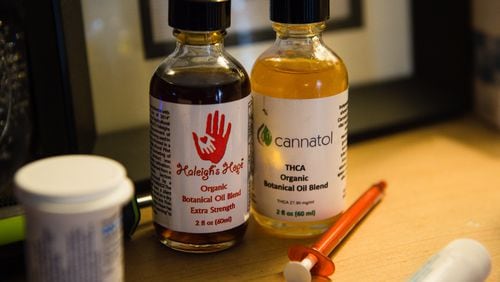Lt. Gov. Casey Cagle and Secretary of State Brian Kemp are both open to researching new ways to expand access to medical marijuana if elected governor, though neither Republican candidate has explicitly endorsed legalizing the in-state cultivation of the drug.
That’s a shift that state Rep. Allen Peake, who wrote the state’s medical cannabis law, has long sought as essential for Georgian suffering from debilitating diseases. And on Tuesday he endorsed Cagle as the best GOP candidate to solve “the medical cannabis access issue early in his first year in office.”
Georgia law allows people suffering from more than a dozen illnesses to register with the state and possess up to 20 ounces of cannabis oil. But because the state doesn't allow in-state cultivation, the roughly 4,000 people on the program's registry risk defying federal law by transporting the drug across state lines.
Many conservatives worry that allowing the drug to be grown legally in the state could lead to laxer restrictions on recreational marijuana. Others say it should be up to the federal government. And Gov. Nathan Deal opposed in-state cultivation this year in part because he said there weren't enough safeguards.
Cagle and Kemp signaled a slightly new approach during Sunday’s debate on Channel 2 Action News, with both saying they’d take advice from a panel of experts who are exploring how to expand the evolving medical marijuana program.
“Access could mean many things, cultivation could be one of those. But there are other methods as well,” Cagle said. “If the only option we have under a very tight regulatory environment is to harvest it here, then I will pursue that.”
Kemp struck a similar chord, saying he supports “research-based expansion” of the program.
“If there’s research there that shows an expansion that could even lead to cultivation,” he said, “I’d definitely be open and supportive to doing that.”
The candidates, who square off in a July 24 runoff, had previously been more skeptical of a major expansion. That's one reason why Peake, a Macon restaurateur who isn't seeking re-election, endorsed business executive Clay Tippins in the crowded primary. Tippins now supports Kemp's campaign.
Both Cagle and Kemp are firmly in agreement on another element of the debate: They both oppose any effort to legalize marijuana for recreational use.
Their approach is starkly different than the policy outlined by former House Minority Leader Stacey Abrams, the Democratic nominee for governor. She supports decriminalizing some marijuana-related offenses and expanding in-state cultivation, which she said could combat prescription drug abuse.
More recent AJC coverage of the Georgia race for governor:








